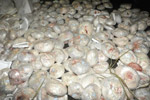On February 1st, local police seized 42 live Sunda pangolins (Manis javanica) from poachers and handed them over to forest rangers in Vietnam’s northern province of Bac Ninh. While the poachers were slapped with a fine, the rangers turned around and sold the live pangolins to local restaurants for a reported $56 a kilo, netting a total of $11,300 for the Critically Endangered mammals, reports the Thanh Nien Daily.
The decision to sell off the pangolins has sparked sharp criticism of Bac Ninh’s Forest Management Department from the conservation group, Education for Nature-Vietnam.
“Any violations regarding the animals should receive criminal punishment. We also can’t treat them simply as evidence of a crime and then trade them,” Nguyen Thi Phuong Dung, deputy director of Education for Nature-Vietnam, told the Thanh Nien Daily. He called the decision a “failure” to protect wildlife.
 The Sunda pangolin, is now listed as Critically Endangered. Photo by: Piekfrosch/Creative Commons 3.0 |
Le Van Minh, the head of Bac Ninh’s Forest Management Department, however contested that the pangolins were too weak to be saved. Moreover, he cited a 2013 law that allows limited trade of pangolins by authorities. But a more recent law from last year—Government Decree No. 160—raised pangolins to a full-protected status in Vietnam, meaning they can’t be traded even by government authorities. Instead, they must be rereleased if in good health and handed over to rescue centers if in poor health. The money raised by the pangolin sale has since been confiscated by the federal government.
Last year, the IUCN Red List updated its assessments of the world’s pangolins, now listing all eight species as threatened with extinction. With scales, super-long tongues, and a smelly predator-repelling anal glands, pangolins are so distinct that they belong to their own taxonomic order, Pholidota. Genetic evidence shows they are most closely related to the carnivores, but pangolins—found both in Asia and Africa—use their tongues and curved claws to raid insect nests.
The IUCN’s Pangolin Specialist Group estimated last year that over a million pangolins had been butchered for their meat and scales in the last ten years—most for consumption in Vietnam and China—making these strange, little-known mammals the most trafficked animals on the planet.
Related articles
|
Over a million pangolins slaughtered in the last decade (07/28/2014) One of the world’s most bizarre animal groups is now at risk of complete eradication, according to an update of the IUCN Red List. Pangolins, which look and behave similarly to (scaly) anteaters yet are unrelated, are being illegally consumed out of existence due to a thriving trade in East Asia. |
|
Lush Cosmetics launches bid to protect pangolins (07/24/2014) Lush Cosmetics has agreed to support an effort to battle trafficking of the Sunda pangolin. |
|
Chinese officials seize nearly a thousand dead pangolins (05/20/2014) In one of the biggest pangolin trafficking cases yet recorded in China, officials confiscated 956 animals stuffed into 189 coolers this month. The dead pangolins were being carried overland in a truck, with the total haul weighing four tonnes. The traffickers were caught at the border of Guangdong Province. If convicted, they face up to ten years in jail. |
|
Camera trap catches rare feline attempting to tackle armored prey (VIDEO) (05/19/2014) One of the world’s least known wild cats may have taken on more than it could handle in a recent video released by the Gashaka Biodiversity Project from Nigeria’s biggest national park, Gashaka Gumti. |
|
Chinese who eat endangered species could face over ten years in jail (04/29/2014) It’s well known that much of the world’s massive illegal wildlife trade ends up in China, including poached tigers, pangolins, and bears. But now those who order pangolin fetuses, tiger blood, or bear bile at a restaurant or market may see significant jail time. |

